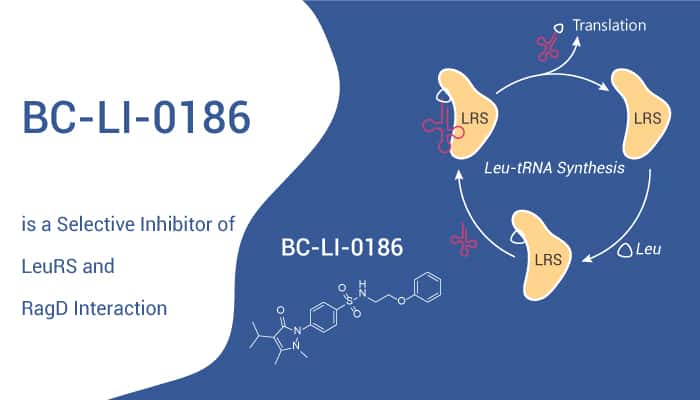BC-LI-0186 is a potent and selective inhibitor of Leucyl-tRNA synthetase (LeuRS) and Ras-related GTP-binding protein D (RagD) interaction (IC50=46.11 nM). It competitively binds to the RagD interacting site of LRS (Kd=42.1 nM). At the same time, it has effects on LRS-Vps34, LRS-EPRS, RagB-RagD association, mTORC1 complex formation, or the activities of 12 kinases.

In the leucine-free medium for 90 min, BC-LI-0186 inhibits phosphorylation of S6K in a dose- and time-dependent manner. However, it has no effects on the phosphorylation of AKT (S473). Meanwhile, It induces cleaved poly (ADP-ribose) polymerase (PARP) and caspase-3 and an increase of p62 in A549 and H460 cells.
This small molecular exhibits cytotoxic effect at nanomolar concentration in NSCLC cells. BC-LI-0186 exhibits IC50 values of 98 nM, 206 nM, 55 nM, 78 nM, 83 nM, 86 nM, 102 nM, 109 nM, 128 nM, and 206 nM in A549, H460, H2228, H1703, SNU1330, H1650, H2009, H358, H2279, H460, and H596 cells, respectively.
BC-LI-0186 can effectively suppress the activity of cancer-associated MTOR mutants and the growth of rapamycin-resistant cancer cells.
It overcomes acquired rapamycin-resistance and inhibits the mTORC1 pathway in isogenic HCT116 cell lines that harbored either M TOR WT (HCT116 MW) or S2035I mutations (HCT116 MM). we can find that it exhibits little-changed efficacy between the wild-type and mutant cells (GI50: 39.49 nM and 42.03 nM, EC50: 105.03 nM and 100.45 nM).
In a K-ras mouse lung cancer model LSL K-ras G12D lung cancer animal model. BC-LI-0186 exhibits antitumor effects and significantly reduces tumor size compared with treatment with a vehicle.
It shows activated caspase-3-positive cells higher in the BC-LI-0186-treated group than in the vehicle or cisplatin-treated group. Additionally, it also reduces p-S6 and p-AKT levels whereas cisplatin alone has minimal effect on both p-S6 and p-AKT expression. BC-LI-0186 exhibits a specific inhibition of mTORC1 and not mTORC2.
Whatmore, it shows a slight (not statistically significant) increase in body weight during the treatment period.
In conclusion, BC-LI-0186 is a potent and promising agent for lung cancer research.
Jong Hyun Kim, et al. Nat Commun. 2017 Sep 29;8(1):732.